Eighth Grade (2018)
Elsie Fisher, Josh Hamilton, Emily Robinson. Written and directed by Bo Burnham.
 Kayla is in the last week of eighth grade, where she’s pretty close to invisible and doesn’t seem to have any close friends. Her classmates vote her “Most Quiet,” which bugs Kayla. She doesn’t think of herself as quiet; she doesn’t want to be quiet. She has things to say, but she can’t seem to interest anyone in hearing her.
Kayla is in the last week of eighth grade, where she’s pretty close to invisible and doesn’t seem to have any close friends. Her classmates vote her “Most Quiet,” which bugs Kayla. She doesn’t think of herself as quiet; she doesn’t want to be quiet. She has things to say, but she can’t seem to interest anyone in hearing her.
Like many young men and women, Kayla spends most of her waking time in front of a screen. A smartphone from which she Snapchats her activity, a MacBook on which she produces YouTube self-help videos for almost no audience. In these videos, she presents herself as socially competent, a positive thinker, an assertive friend. She’s none of these things in real life, and the only person who seems genuinely interested in everything going on with her is the one person she doesn’t want listening: her single-parent father.
 Because most of us were eighth-graders millions of years ago, we’re like Kayla’s dad. We see what a bright, interesting, resilient young woman Kayla is. Unlike Kayla, we also see that the young people around her, the popular kids throwing pool parties at their huge homes and the nerdy cousins and the handsome (barely pubescent) jocks all have their own growing pains.
Because most of us were eighth-graders millions of years ago, we’re like Kayla’s dad. We see what a bright, interesting, resilient young woman Kayla is. Unlike Kayla, we also see that the young people around her, the popular kids throwing pool parties at their huge homes and the nerdy cousins and the handsome (barely pubescent) jocks all have their own growing pains.
Perhaps they struggle differently, but they struggle as deeply. Kayla doesn’t see that the pool party girl knows her married mom flirts shamelessly with Kayla’s dad, or that the nerdy boy is, by virtue of being the least cool person in the room, perhaps the only person at the party not pretending to be something he’s not, and therefore the one most worthy of her friendship.
 Kayla takes a foray or two into the world of grownups (read: high-schoolers) where she sort-of experiences the kind of acceptance she longs for. I don’t know what such excursions were like for anyone else, but I imagine Kayla doesn’t see anything especially unusual.
Kayla takes a foray or two into the world of grownups (read: high-schoolers) where she sort-of experiences the kind of acceptance she longs for. I don’t know what such excursions were like for anyone else, but I imagine Kayla doesn’t see anything especially unusual.
Which makes Eighth Grade one of the realest looking movies about pre-high-school I’ve ever seen. Performances all around are solid and thoughtful, and the script brilliantly gives grownups (read: people old enough to be Kayla’s parent) one film and young people another, both of them sincere and provocative. This is one of the best movies for younger teens I’ve seen in a very long time.
9/10
92/100

 I never saw 2014’s The Equalizer, so The Equalizer 2 is completely fresh snow for me, and it’s not bad if you don’t mind your snow a little on the vindictive side.
I never saw 2014’s The Equalizer, so The Equalizer 2 is completely fresh snow for me, and it’s not bad if you don’t mind your snow a little on the vindictive side. Someone close to McCall is murdered, and there (apparently) aren’t very many people close to McCall, so he goes after the people responsible, only he doesn’t know who these people are. At first.
Someone close to McCall is murdered, and there (apparently) aren’t very many people close to McCall, so he goes after the people responsible, only he doesn’t know who these people are. At first. Alas, the film is directed by Antoine Fuqua, and I haven’t seen all of his movies with Denzel, but I’ve seen Training Day, a film I disliked because Denzel hams it up like an Easter brunch. Thankfully, there are only a couple of offending scenes like this here, but there was a moment where I was half-certain McCall was about to proclaim at the top of his lungs that King Kong ain’t got s*** on him. I tolerated these couple of scenes because I like the rest of this film just fine.
Alas, the film is directed by Antoine Fuqua, and I haven’t seen all of his movies with Denzel, but I’ve seen Training Day, a film I disliked because Denzel hams it up like an Easter brunch. Thankfully, there are only a couple of offending scenes like this here, but there was a moment where I was half-certain McCall was about to proclaim at the top of his lungs that King Kong ain’t got s*** on him. I tolerated these couple of scenes because I like the rest of this film just fine. Picture a world like the one in Who Framed Roger Rabbit? but instead of humans and toons, the world is cohabited by humans and puppets with serious discrimination against puppets. This is the world in which The Happytime Murders is set, only instead of some made-up town, we are right in Los Angeles with all its glamour and sleaze.
Picture a world like the one in Who Framed Roger Rabbit? but instead of humans and toons, the world is cohabited by humans and puppets with serious discrimination against puppets. This is the world in which The Happytime Murders is set, only instead of some made-up town, we are right in Los Angeles with all its glamour and sleaze.
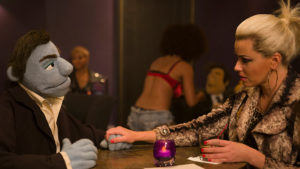
 It’s difficult to know how to feel about what happens to Rick Wershe, Jr. at the end of White Boy Rick, and this makes it difficult to decide how I feel about the movie. Do we care more about justice in the eyes of the law, or justice according to a sense of right and wrong, and how do Rick’s choices stand up to either standard? If the film wants us to take a side, I can’t tell which it is.
It’s difficult to know how to feel about what happens to Rick Wershe, Jr. at the end of White Boy Rick, and this makes it difficult to decide how I feel about the movie. Do we care more about justice in the eyes of the law, or justice according to a sense of right and wrong, and how do Rick’s choices stand up to either standard? If the film wants us to take a side, I can’t tell which it is.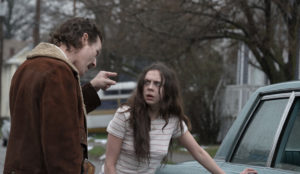 This makes me dissatisfied with the film, which is a disappointment because I like and care about this character, and Richie Merritt as White Boy Rick does a nice job playing him. Guided by a sense that life is ripping him off but feeling empowered to do something about it, Rick is suspicious of his father’s optimistic outlook and unsure what to do about a junkie older sister whom he cares very deeply about.
This makes me dissatisfied with the film, which is a disappointment because I like and care about this character, and Richie Merritt as White Boy Rick does a nice job playing him. Guided by a sense that life is ripping him off but feeling empowered to do something about it, Rick is suspicious of his father’s optimistic outlook and unsure what to do about a junkie older sister whom he cares very deeply about. It’s fairly easy to read Rick Sr.’s moral code, but Rick Jr.’s is still being formed. Which of his bad decisions are mere errors in judgment and which are dictated by a slightly skew sense of right and wrong? I’m okay with a movie whose position differs from mine on this, but the movie doesn’t seem to take a position, taking some of the power out of some very good performances.
It’s fairly easy to read Rick Sr.’s moral code, but Rick Jr.’s is still being formed. Which of his bad decisions are mere errors in judgment and which are dictated by a slightly skew sense of right and wrong? I’m okay with a movie whose position differs from mine on this, but the movie doesn’t seem to take a position, taking some of the power out of some very good performances. Tucker Crowe released one moderately successful album called Juliet and then disappeared. Decades later, his fans dedicate their free time to deconstructing the album and speculating on Crowe’s whereabouts in an online forum run by Duncan Thomson, a college lecturer in a small town in England. Duncan’s live-in girlfriend and the central character in Juliet, Naked is Annie Platt, the curator and director of the town’s museum.
Tucker Crowe released one moderately successful album called Juliet and then disappeared. Decades later, his fans dedicate their free time to deconstructing the album and speculating on Crowe’s whereabouts in an online forum run by Duncan Thomson, a college lecturer in a small town in England. Duncan’s live-in girlfriend and the central character in Juliet, Naked is Annie Platt, the curator and director of the town’s museum.

 Ethan Hawke can be an annoying actor. I find myself demanding he prove his sincerity with every performance, even in those great sequels to Before Sunrise. Here is a film where he mostly wins me over (despite one suspiciously gratuitous piano performance), one of the best roles I’ve seen him in. Byrne has what I think of as the Emily Blunt role, which used to be the Minnie Driver role, but she does it in the sweetest, most relatable way that makes me wish she had more starring vehicles.
Ethan Hawke can be an annoying actor. I find myself demanding he prove his sincerity with every performance, even in those great sequels to Before Sunrise. Here is a film where he mostly wins me over (despite one suspiciously gratuitous piano performance), one of the best roles I’ve seen him in. Byrne has what I think of as the Emily Blunt role, which used to be the Minnie Driver role, but she does it in the sweetest, most relatable way that makes me wish she had more starring vehicles. Riley North witnesses the horrible murder of her husband and young daughter. A crooked system lets the perpetrators get off with no punishment, so Riley disappears for a few years, showing up in time to commemorate the fifth anniversary of the murder, but this time with Jason-Bourne-like skills. And she’s not back to offer second chances.
Riley North witnesses the horrible murder of her husband and young daughter. A crooked system lets the perpetrators get off with no punishment, so Riley disappears for a few years, showing up in time to commemorate the fifth anniversary of the murder, but this time with Jason-Bourne-like skills. And she’s not back to offer second chances.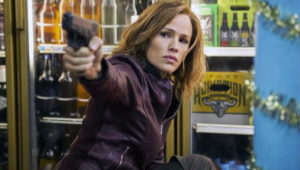 A movie like this is pretty much review-proof. It’s Jennifer Garner in badass mode, as she was in her Alias TV program. I was aware of its terrible reviews before I went in, but whatever. It’s Jennifer Garner.
A movie like this is pretty much review-proof. It’s Jennifer Garner in badass mode, as she was in her Alias TV program. I was aware of its terrible reviews before I went in, but whatever. It’s Jennifer Garner. I dislike the concept of a vigilante, but I do enjoy vigilante movies, and how many have female leads? Seriously, you can put Riley right up there with any of them. I like her better than Charles Bronson in Death Wish or Clint Eastwood in those westerns. I don’t care that there is nary an explanation to be found for her quickly attained super-amazing death-machine skills. I just want more Peppermint.
I dislike the concept of a vigilante, but I do enjoy vigilante movies, and how many have female leads? Seriously, you can put Riley right up there with any of them. I like her better than Charles Bronson in Death Wish or Clint Eastwood in those westerns. I don’t care that there is nary an explanation to be found for her quickly attained super-amazing death-machine skills. I just want more Peppermint.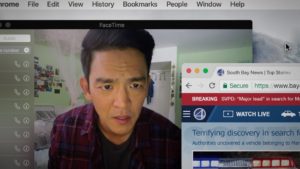 Searching is the second movie I’ve seen in September 2018 that’s marketed as a thriller but is really a mystery. So if you are not thrilled by thrillers (as I am not), don’t let the trailer keep you away. There are a couple of dark episodes, but the film stays away from edge-of-your-seat suspense or immediate peril for the main character. The main character’s teenaged daughter disappears and may be dead, and very sensitive parents may wish to skip it for this reason, but even with this major plot element, the film is really not at all scary.
Searching is the second movie I’ve seen in September 2018 that’s marketed as a thriller but is really a mystery. So if you are not thrilled by thrillers (as I am not), don’t let the trailer keep you away. There are a couple of dark episodes, but the film stays away from edge-of-your-seat suspense or immediate peril for the main character. The main character’s teenaged daughter disappears and may be dead, and very sensitive parents may wish to skip it for this reason, but even with this major plot element, the film is really not at all scary. Some viewers, however, may find it gimmicky. The entire movie is seen on electronic screens of some sort, usually computer screens and smartphone screens. Even when we’re looking at live news reports, we see them not on television, but via streaming through a web browser. There’s a good reason for the gimmick, and although this device forces the filmmakers to resort to some unrealistic exposition by way of news reporters who say things they would never say (and televise things they would never televise), it’s worth this bit of tradeoff for the social issues they explore. In this way, Searching is not a bad partner for Eighth Grade.
Some viewers, however, may find it gimmicky. The entire movie is seen on electronic screens of some sort, usually computer screens and smartphone screens. Even when we’re looking at live news reports, we see them not on television, but via streaming through a web browser. There’s a good reason for the gimmick, and although this device forces the filmmakers to resort to some unrealistic exposition by way of news reporters who say things they would never say (and televise things they would never televise), it’s worth this bit of tradeoff for the social issues they explore. In this way, Searching is not a bad partner for Eighth Grade.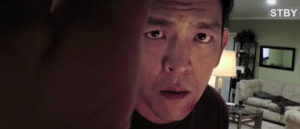 Cho is David Kim, the recently widowed father of Margot, a high-achieving high-school senior. Margot disappears one night when she’s supposed to be at a study group. As police detective Rosemary Vick (Debra Messing) and her team trace the evidence, they ask David to contact all of Margot’s friends to try and figure out where she might have gone. The more David looks, the clearer it is that he really doesn’t know his daughter.
Cho is David Kim, the recently widowed father of Margot, a high-achieving high-school senior. Margot disappears one night when she’s supposed to be at a study group. As police detective Rosemary Vick (Debra Messing) and her team trace the evidence, they ask David to contact all of Margot’s friends to try and figure out where she might have gone. The more David looks, the clearer it is that he really doesn’t know his daughter.